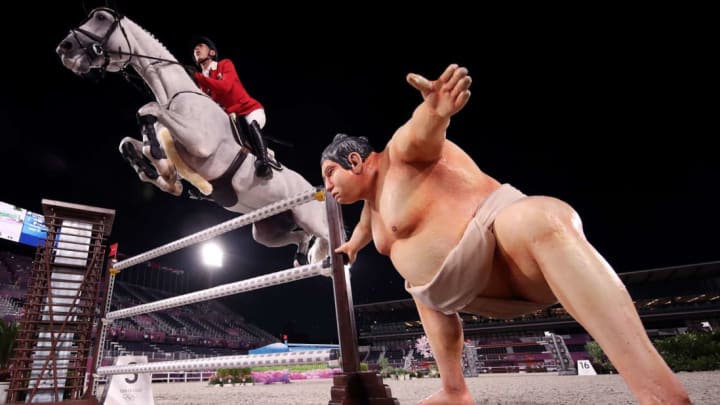As is custom at the Olympics, the arena at Tokyo’s Equestrian Park is designed to evoke the spirit of the Games and reflect the culture of the host country. In this case, decorations around the jumping hurdles include a gong, bonsai, taiko drums, kimonos, and more.
Among that “and more” is a life-sized—and life-like—statue of a sumo wrestler that may or may not have dashed a few Olympic dreams.
The statue squats with outstretched arms next to the 10th of 14 obstacles in the arena, his back turned toward horse and rider as they round a corner and prepare to approach the jump. Or, as UK rider Harry Charles described it to the Associated Press, “As you come around, you see a big guy’s (butt).”
Amusing, maybe, to the human competitors, but their equine counterparts didn’t seem to find any humor in the situation. Charles, for one, witnessed “four or five horses really taking a spook” to the wrestler. During a qualifying round, more than one horse didn’t end up completing the 10th jump—a penalty that helped ruin their riders’ chances of progressing to the event finals. Some suggested that the sumo wrestler’s imposing posterior and attack stance caused the horses to balk.
“You know, horses don’t want to see a guy, like, looking intense next to a jump, looking like he’s ready to fight you,” Israel rider Teddy Vlock told the Associated Press.
But the sumo wrestler wasn’t the only suspected culprit for the troubles at number 10. Some people proposed that the dazzling lights above or the cherry blossoms beside the obstacle had spooked the horses, while others thought it could’ve just been because the jump came immediately after a sharp turn.
All speculation aside, Olympic equestrians generally take these types of mishaps in stride. “To be honest, you expect it in the Olympic Games,” UK’s Scott Brash told the Associated Press. “If it was just plain old jumps, it’d be just like any other week.”
[h/t Associated Press]
